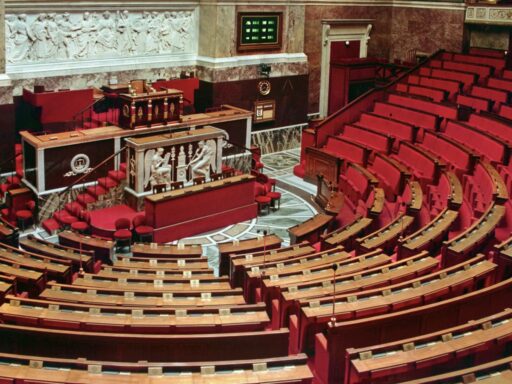Visit motion of censure is a powerful political tool in the French parliamentary system. Mainly used in theNational Assemblyit enables MPs to challenge the policy pursued by the government in place. This article explores the various aspects of the motion of censure, how it works, and its impact on the French political landscape.
Contents
What is a motion of censure?
A motion of censure is a procedure whereby members of the National Assembly express their disapproval of the government. This method enables the people's representatives to exercise control over the actions and policies of the executive. The ultimate aim of this initiative may be to provoke the fall of the government in the event of success.
To be adopted, the motion of censure must receive an absolute majority of votes, which currently corresponds to 289 deputies. This process is provided for in article 49.3 of the French Constitution, often used as a means of political pressure by the opposition.
The origin and legal framework of the motion of censure
The article 49.3 of the 1958 Constitution provides a specific framework for the motion of censure procedure. This gives the Prime Minister the option of committing the government before the National Assembly. In response, the deputies can table a motion of censure to reject this initiative.
This process has been used many times since the Fifth Republic. Michel Barniera key figure in French politics, also found himself in this situation when he was a member of the government.
The main players in the motion of censure
Several players play a crucial role in the implementation of a motion of censure:
- Members : They are the initiators of the motion of censure. A minimum of 58 MPs must sign for the motion to be considered.
- The government : If a motion is tabled, the government must defend its policy before the National Assembly.
- The President of the National Assembly : He ensures that the procedure runs smoothly and complies with constitutional rules.
Procedure for a motion of censure

The process begins with the tabling of a motion of censure by a group of MPs. This motion must then be examined by the National Assembly within 48 hours of its tabling.
During the dedicated session, discussions between the government and MPs allow each side to present its arguments. At the end of these discussions, a vote is taken by show of hands or public ballot. If the motion obtains the required majority, the government is forced to resign.
The consequences of a successful motion of censure
When the motion of censure is approved, it automatically results in the government resignation. This scenario forces the President of the Republic to appoint a new Prime Minister and, in some cases, to call new general elections.
Such a decision can have a domino effect, creating temporary political instability but also paving the way for new alliances and reforms. For example, the formation of a new popular front or winnings for games such as Rassemblement National can result from a successful motion of censure.
However, it is rare for a motion of censure to succeed, especially when the government has a stable majority in the National Assembly.
Famous cases of motions of censure

The 1962 motion of censure against Georges Pompidou
One of the most striking examples of a successful motion of censure took place in 1962, directed against the government of Georges Pompidou. The motion followed Charles de Gaulle's announcement of a referendum to elect the President of the Republic by direct universal suffrage. The National Assembly voted the motion of censure, leading to the fall of the Pompidou government. Nevertheless, following the early parliamentary elections, de Gaulle regained a solid parliamentary majority.
The 1992 motion of censure under Pierre Bérégovoy
In 1992, another resounding motion of censure was tabled against Pierre Bérégovoy's government. This time, the opposition criticized the country's economic management and the so-called "Élysée telephone tapping affair". Although the motion was unsuccessful, it highlighted major criticisms of the government and considerably weakened its authority.
The 2016 motion of censure against Manuel Valls
In 2016, Manuel Valls used article 49.3 to pass the Labor Law without a vote. This action provoked an immediate reaction from the opposition, which tabled a motion of censure. Despite a large-scale mobilization, the motion failed, but underlined the tensions within the Socialist Party and beyond.
The political impact of motions of censure
Even if the motions of censure do not always lead to government resignationThey play a central role in parliamentary dynamics. In particular, they enable MPs to show their disagreement and represent the grievances of their constituents.
The debates sparked by a motion of censure force the government to justify its choices and clarify its position on controversial issues. This can lead to political adjustments or even concessions to avoid future conflicts.
A formidable political weapon
Visit motion of censure remains a powerful asset in the opposition's arsenal. It creates a rare opportunity to overthrow the current government and propose a political alternative. It is also a means for minority parties to make their voices heard on the national political scene.
However, the effectiveness of this tool depends to a large extent on the parliamentary majority present. A government with strong support in the National Assembly will have less to worry about in the face of attempts at censure. On the other hand, an already weakened executive may find itself in a perilous position.
In short, the motion of censure is much more than a simple vote of no confidence. It embodies an essential mechanism in the democratic functioning of France, enabling Parliament to exercise an effective counterweight to the government. Whether it succeeds or fails, it symbolizes the vitality of political debate and the responsibility of elected representatives towards their fellow citizens.
Whether it's to signal fierce opposition to certain policies, to denounce a scandal or simply to show a loss of confidence, the motion of censure remains a fundamental pillar of French political life. Over the decades, it has proved its importance and influence in structuring French republican institutions.





